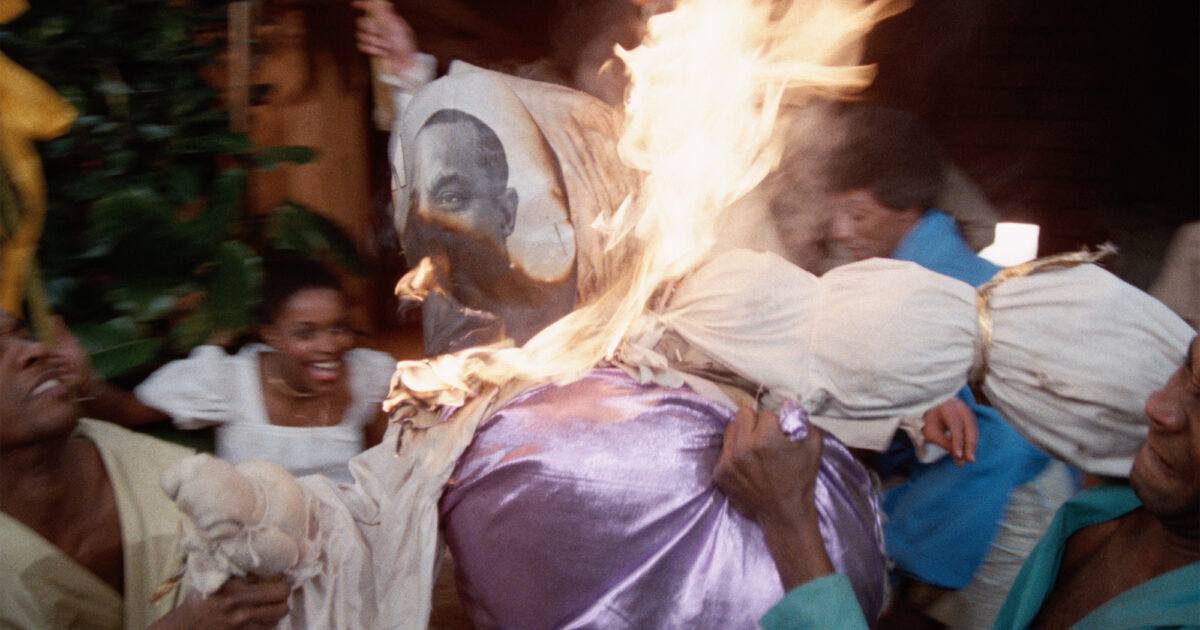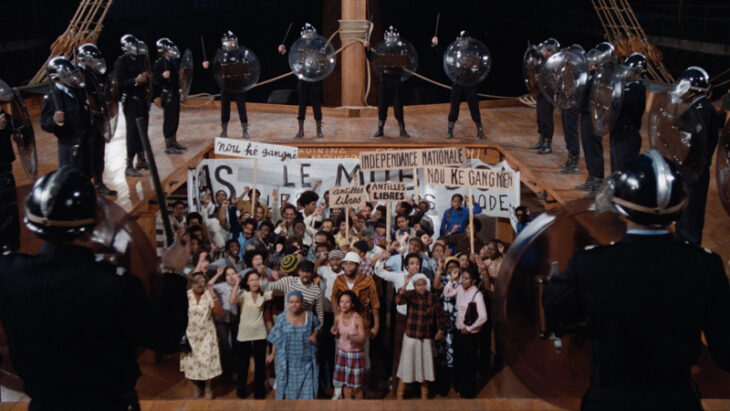I was invited to introduce the theme of 10th and last Critics’ Choice at the International Film Festival Rotterdam. I also lead the roundtable based on this theme. Here is the introduction:

Good morning everyone,
My name is Janilda Bartolomeu and I am a researcher, film programmer and occasional filmmaker based here in Rotterdam. First of all, I would like to take a moment and extend my gratitude towards Dana and Jan Pieter for entrusting me with the responsibility of introducing this year’s Critics’ Choice theme – especially since it is also their last edition. May the conversation matters and thought process shared here today will continue to linger on some way, shape or form.
The first e-mail, in which Dana and Jan-Pieter introduced the theme of the whisper to me, ended with the following question: Will the apparent cacophony of our current time, lead us to a discovery of dissonance or polyphony? Today I humbly enter this space without a revelation or anything close to it – and without any expectations of where our conversations will take us. What I have brought for you all, is an experimental offering. It is still a work in progress, so bear with me. But it is an offering that will require some courage and a moment of surrender on all our parts.
When I saw the word ‘whisper’ in the introduction email, my mind immediately returned to an essay by Tina M. Camp titled The Opacity of Grief, published by BOMB Magazine. In the essay she relays the experience of losing two of the most gentle yet impactful people in her life due to respiratory illnesses. Her father (who she describes as the sublime hummer) and her auntie ( who is dubbed the gentle whisperer). She describes their chosen modes of communication as such:
“The whisper and the hum are two of the most under-appreciated sonic utterances in the human auditory spectrum. They signify like rustling leaves or the slow steady rush of moving water. Both my auntie’s whisper and my dad’s hum made one strain to hear or lean in to listen. Both were befuddling.”
These words form an homage to Campt’s father who resorted to humming; as his voice faltered due to lung cancer, and the future became more and more uncertain. But who I want to focus on in this introduction is her auntie – who masterfully deployed her whisper as a stealthy, mischievous weapon. As a screen to speak, almost without using her voice.
According to Campt this was a strategy that always commanded attention even though unintelligible. A means through which she used to say things you weren’t supposed to hear, but needed to be said regardless. Her unintelligible and underestimated nature became a form of opacity in action. The concept of opacity quoted in this essay, is that of Martinican writer Édouard Glissant. It is a poetic call, to claim his right to unintelligibility, a strategy to escape colonial capture and its dominance. And therefore a means of escaping its incessant hunger for transparency, in order to grasp and consume. A quote by Glissant that Campt highlights in her essay is:
“The opaque is not the obscure, though it is possible for it to be so and be accepted as such. It is that which cannot be reduced, which is the most perennial guarantee of participation and confluence.”
—Édouard Glissant, Poetics of Relation (191)
A sentiment that will continue to ripple throughout this introduction.
As I put my ear upon our contemporary cacophony, all I hear is an assembly of scrambling voices. Some well-intentioned, some not so much so. A reflection of our fraught and rapidly changing world and industries, an unfathomable portrait of global and inter communal conflicts, power struggles across many contexts and the frightful realisation that the direction we are moving into merely promises – culturally, politically, economically and environmentally unsustainable conditions of living. We are living in a collective sense of uncertainty.
Our human reflex to this – is to want to contain these crises, to grasp for solutions, to mobilise whether it be with intentions of advocating for more inclusive solutions or to engage in a struggle for power. But what if leaning into the whisper requires an alternative approach entirely? What if our position is not as much on a high-ground above the whirlwind conflict (as we’d like to think)- but the wind is already blowing into a specific direction and agency enlists us instead to the other way around? What if we are posturing towards the promised land of progress and equality, but the particular way in which our human world is set up, only allows us to play catch up?
According to ‘more-than-human’ philosopher, writer and post-activist, Bayo Akomolafe, the ways in which respond to our crises, has become (and actually long been) a crisis in itself. This is largely due to the global, social, political, and economical structures we are entangled with, and cannot afford to escape. The solutions we try to come up with are so entangled with therefore tend to become part of the human world order and perpetuate it. In order for one to even attempt to escape, it requires a massive upheaval of our consciousness, and the willingness to walk away from consensual reality with a capital R, even if for just a brief moment. According to Akomolafe this would require one to embrace their sense of bewilderment, to stay with the befuddlement instead of containing it, posturing ourselves away from it due to its non-commitment to a sense of productivity and business as usual. It instead requires us to surrender to opacity, (not a state of being) but one of becoming where we can meet the irreducable halfway. Do not stifle it, as this is where transformation happens.

This reminds me of a phenomenon I call the shipwreck of Enlightenment. Best summed up in the images I was exposed to in the film West Indies (1979), written and directed by Med Hondo. To those not familiar, the film satirises the colonial myth of linear progress by portraying the theatrics and sheer construction of French empire in the West Indies. The musical carries the viewer from slavery, to the struggle for independence to the 20th century immigrations to France- but the kicker is that all this social and historical progress takes place within the confines of a slave ship, which after centuries has never ceased to exist.
This aspect of the film grounds the audience in the fact that the hierarchical and capital structures, preconceived notions and definitions of power of colonialism never disappeared but merely managed to rebrand themselves. The ship remains functional to this day.
This analogy of the ship is also echoed in Bayo Akomolafe’s ruminations on one of our contemporary solutions, that of Inclusion. He likens this (usually) well-intentioned tool of progression to another ship. The Titanic. In the sense that we, especially us working within progressive institutions, have come to the realisation that we’ve missed out on a plethora of perspectives, knowledge, and art – due to our lenses not being attuned to their nature and thus unable to grasp them.
Akomolafe questions whether these losses – left in acts of presumption, overlooking and underestimation – are truly retrieved by merely granting marginalised people a seat at the existing table. He likens the seat at the table, to the act of giving out equal seating on the sinking Titanic, moving marginalised folks from below the deck to the top of the deck a ship were are all sinking and scrambling on. His offering is that these solutions are unsustainable and that we as humans need to relate to the world in a different way, and in its totality.
For decades many decades many of us, including myself, have had Audre Lorde’s quote: “The master’s tools will never dismantle the master’s house” at the tip of our tongues, but the more I reflect on our current condition, the more I wonder how much agency lies in our hands to truly wield this sentiment.
So what if we collectively jump off this presumably Enlightened ship, and surrender ourselves to the winds and seas of Bewilderment? What if for this moment, and in this space, we play – now that we can afford to? What if this morning and afternoon we commit ourselves to generously leaning in and losing our way?
To somewhat ground these sentiments in this space, in this company – how do we jump ship within the realm of film criticism? What would it take to realistically and consciously lose our way within the film industry? From my relatively green understanding of film criticism, the practice seems to have great possibilities as a dialogic lens. And could therefore be one of the spaces in which we do not chase behind what we can do, but stay with the trouble, the frictions, the entanglements and lean in to hear where we are now?
In this short span of time, I’ve raised many entangled ideas, connotations and questions. Do not attempt to unravel them. Instead I extend an invitation to let ourselves unravel together first.
An invitation to consciously lose our ways.
An invitation to surrender to any strand that might have resonated.
An invitation to not be eloquent. And last but not least, an invitation to lean into the whispers whatever mischievous forms they may take.